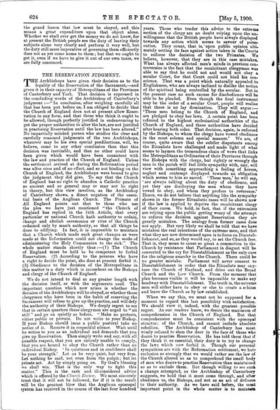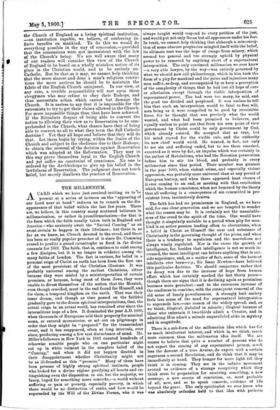THE RESERVATION JUDGMENT. T HE Archbishops have given their decision as
to the legality of the Reservation of the Sacrament,—and given it in their capacity of Metropolitans of the Provinces of Canterbury and York. That decision is expressed in the concluding words of the Archbishop of Canterbury's judgment :—" In conclusion, after weighing carefully all that has been put before us, I am obliged to decide that the Church of England does not at present allow Reser- vation in any form, and that those who think it ought to be allowed, though perfectly justified in endeavouring to get the proper authorities to alter the law, are not justified in practising Reservation until the law has been altered." No impartially minded person who studies the clear and carefully reasoned judgments of the two Archbishops, whatever may be his own special predilections, will, we believe, come to any other conclusion than that this decision was inevitable, and that no other could have been given which would have been consistent with the law and practice of the Church of England. Unless the settlement arrived at during the Reformation period was ultra vires and of no effect, and so not binding on the Church of England, the Archbishops were bound to give the judgment they did give. To say that the Church of England has no right to abandon a Catholic practice so ancient and so general may or may not be right in theory, but this view involves, as the Archbishop of Canterbury shows, a direct negation of the essen- tial basis of the Anglican Church. The Primate of All England points out that to those who use the plea we have just mentioned "the Church of England has replied in the 34th Article, that every particular or national Church hath authority to ordain, change and abolish ceremonies or rites of the Church ordained only by man's authority, so that all things be done to edifying. In fact, it is impossible to maintain that a Church which made such great changes as were made at the Reformation could not change the mode of administering the Holy Communion to the sick." The whole matter stands shortly thus :—(1) The Church of England must be held to be competent to forbid Reservation. (2) According to the persons who have a right to decide the point, she does at present forbid it. (3) Obedience to the decision of the Metropolitans in this matter is a duty which is incumbent on the Bishops and clergy of the Church of England.
We do not intend to deal at any greater length with the decision itself, or with the arguments used. The important question which now arises is whether the decision of the Archbishops will be obeyed, or whether those clergymen who have been in the habit of reserving the Sacrament will refuse to give up the practice, and will defy the authority of their Bishops. We deeply regret to see that in certain quarters these clergymen are urged to "sit still" and go on quietly as before. "Make no protests, either public or private. Do not write to your Bishop. If your Bishop should issue a public pastoral take no notice of it. Receive it in respectful silence. Wait until he writes to you as an individual and demands that you give up Reservation. Then simply write and say, with all possible respect, that you are entirely unable to comply, that you are bound to obey the Church rather than an individual Bishop. 'In quietness and in confidence shall be your strength.' Let us be very quiet, but very firm. Let nothing be said, not even from the pulpit ; but let priests act. Act by simply going on. By God's blessing we shall win. That is the only way to fight this matter." This is the rash and ill-considered advice which is offered by the Church, Review. We most sincerely trust that it will not be followed, for if it is the result will be the greatest blow that the Anglican episcopal system has received in the course of the last four hundred years. Those who tender this advice to the extreme section of the clergy are no doubt relying upon the un- willingness that the British people have always displayed towards any action which seems to savour of perse- cution. They count, that is, 'upon public opinion ulti. mately setting its face against action taken in the Courts to enforce the decision of the two Primates. We believe, however, that they are in this case mistaken. What has always affected men's minds in previous con- troversies is the fact that the recalcitrant clergyman was able to say that he could not and would not obey a secular Court, for that Court could not bind his con- science. That was a point which naturally appealed to Englishmen, who are always inclined to dislike the notion of the spiritual being controlled by the secular. But in the present case no such excuse for disobedience will be able to be pleaded. Even though the final instrument may be the order of a secular Court, people will realise that there is no lay domination. They will argue :- 'These These men belong to the Church of England, and are pledged to obey her laws. A certain point has been referred to the highest ecclesiastical authorities of the Church of England, and these authorities have decided after hearing both sides. That decision, again, is enforced by the Bishops, to whom the clergy have vowed obedience in the most solemn and special manner.' 'We are, of course, quite aware that the subtler disputants among the Ritualists have challenged and made light of what seems to laymen the tremendous chain of vows that links the Metropolitans as Ordinaries of their Provinces through the Bishops with the clergy, but rightly or wrongly the man in the parish will feel little sympathy with, nay, will view with something approaching a feeling of horror, neglect and contempt displayed towards an obligation which seems to him so sacred. 'These men,' he will say, are always talking about the duty of obedience, and yet they are disobeying the men whom they have vowed to obey, and whom they profess to reverence.' Hence, we do not believe that anything like the sympathy shown in the former Ritualistic cases will be shown now if the law is applied to deprive the recalcitrant clergy of their cures. We hold, in fact, that if the extremists are relying upon the public getting weary of the attempt to enforce the decision against Reservation they are greatly mistaken. The analogy from former cases does not apply. But very likely we shall be told that we have mistaken the real intentions of the extreme men, and that what they are now determined upon is to force on Disestab- lishment, and so, as they would say, to set the Church free. That is, they mean to cause so great a commotion in the Church by resistance that Parliament in disgust will be converted to the cry for Disestablishment as the only cure for the religious anarchy in the Church. There could be no greater mistake. Parliament will never consent to Disestablishment in order that the Ritualists may cap- ture the Church of England, and drive out the Broad Church and the Low Church. From the moment that plan becomes visible it will be impossible to make any headway with Disestablishment. The truth is, the extreme men will either have to obey or else to create a schism and leave the Church as by law established.
When we say this, we must not be supposed for a moment to regard this last possibility with satisfaction. We should view it., indeed, with the greatest • possible regret. As our readers know, we desire the maximum of comprehension in the Church of England. But that comprehension must be consistent with the episcopal structure of the Church, and cannot include absolute rebellion. The Archbishop of Canterbury has most wisely refused to slam the door in the face of those who desire to practise Reservation. He has told them that if they think it so essential, their duty is to try to change the laws which now forbid it. Though our personal sympathies are with the Reformation settlement, we hate exclusion so strongly that we would rather see the law of the Church altered so as to comprehend the small body of men who desire to practise Reservation than maintained so as to exclude them. But though willing to see such a, change attempted, as the ArchbighOp of Canterbury suggests, we hold that it must come through, and after obedience to, the Bishops, and not as an act of defiance to their authority. As we have said before, the moat important point in the whole matter is to maintain
the Church of England as a living spiritual institution, —an institution capable, we believe, of conferring in- finite benefits on mankind. To do this we would do everything possible in the way of concession,—provided that the concessions were not inconsistent with the law of the Church's being. We are well aware that many of our readers will consider this view of the Church of England to be based on a wholly mistaken notion of its place in the Christian world, and to be entirely un- Catholic. But be that as it may, we cannot help thinking that the more sincere and deep a man's religious convic- tions the more anxious he should be to maintain the fabric of the English Church uninjured. In our view, at any rate, a terrible responsibility will rest upon those clergymen who may refuse to obey their Bishops, and thus necessitate action which cannot but damage the Church. It is useless to say that it is impossible for the extremists to try to get their claims allowed in the Church. Far more impossible things than that have been achieved. If the Ritualists despair of being able to convert the nation to allowing their view as to Reservation to be com- prehended in the Church, what chance have they of being able to convert us all to what they term the full Catholic doctrine i Yet they all hope and believe that they will do that. Let them begin by trying, within the limits of the Church and subject to the obedience due to their Bishops, to obtain the reversal of the decision against Reservation which was adopted at the Reformation. They may in this way prove themselves loyal to the English Church and yet suffer no constraint of conscience. No one is ordered by the Archbishops to give up his belief in the lawfulness of Reservation. The judgment does not touch belief, but merely disallows the practice of Reservation.







































 Previous page
Previous page